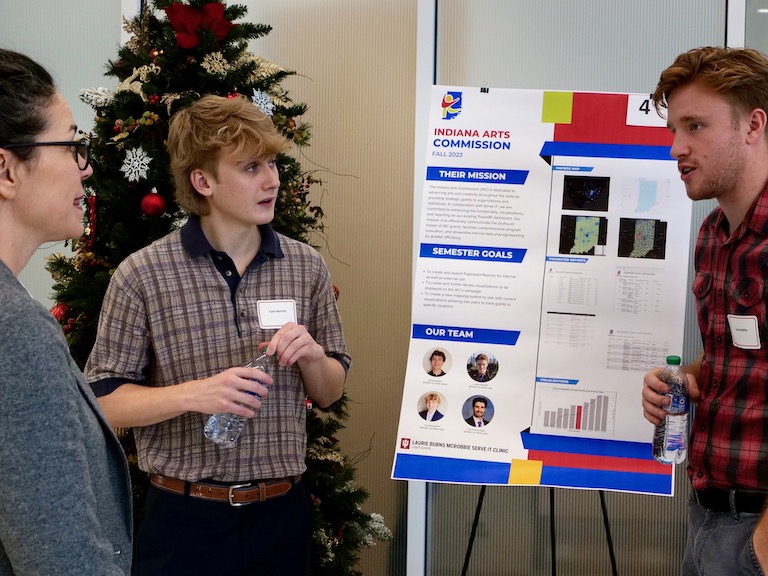
Visualization matters.
Case in point -- the Data Viz & Business Intelligence project that was among the 25 posters showcased during the semester-ending Laurie Burns McRobbie Serve IT Clinic poster display at the Luddy School of Informatics, Computing, Engineering.
Four Luddy students worked with the City of Bloomington to review issues such as fire incident responses, fire incident analysis, the influx of scooters in the city and domestic battery incidents.
The poster provided a clear picture of the data, what was happening and what it meant.
“We met with our client biweekly to discuss our findings and come up with ways to better visualize them,” said Salai Aung, a senior informatics major.
For fire incidents, data was broken down into zip codes. It showed that 14 percent of overall responses were due to smoke detector activation.
Also, 240,000 scooter trips were recorded in 2023 in Bloomington, an enormous number that raised significant concern among city residents. Aung said August and September were especially critical in developing enhanced regulations and educational initiatives.
“The purpose was to present visualizations of story boards that were accessible and easy to understand,” he said. “We did a good job of accomplishing that. Throughout the semester, we had help with our client and industry mentor to give us feedback, and then we’d make changes.”
Davin Kim, a senior majoring in information systems, said the biggest challenge was getting together as a team because of different class schedules. They met weekly to work with the city.
“Through good collaboration, good team work, and also good work ethic, we finished all the work on time, and delivered amazing visualizations,” he said.
Data Viz was among the projects that Una Thacker, Director, Community Engaged Learning, said reflected an impressive culmination of semester work.
“They create these posters to demonstrate the work they’ve done,” she said. “It’s like a poster form of a case study for a portfolio. Each of them has a different project. Everyone is working with a client. We try as hard as we can to mimic the work environment.”
As far as the quality, Thacker called it an “amazing semester.”
She praised the Eviction Prevention Project team, which made a website listing the evictions in Bloomington.
“Without those students and the people helping them, sometimes doing the work for free,” she says, “we couldn’t access that information. It just doesn’t exist otherwise.”
A lot of these projects involve building or improving websites for community organizations. Thacker mentioned the Bloomington Refugee Support Network, which lacks resources, as does the Tandem Community Birth Center, to build their own sites.
“They all need a website to get the word out about what they’re doing,” she said. “Our students help with that.”
Consider the Jewish Theatre Site. Four Luddy designers worked to build a website that would improve organization, make it easier for people to find the site as well as buy multiple tickets to theatre events. The previous system allowed just one ticket purchase at a time.
“We added a new ticket template so now people can buy as many as they want,” said Sam Popek, a junior informatics major.
Thacker said Luddy Serve and Teach IT students often go above and beyond what’s required. She said the security team did security assessments and presentations for the Jewish Theatre Site, important given current Middle East tension between Israel and Hamas in the wake of this fall’s terror attack. The team noticed a home address was displayed on the website, a potential danger.
“They realized there was a security risk,” Thacker said. “That’s not necessarily something I tell them to look for. They’re looking for all kinds of security issues. They’re thinking on their own, which is great.”
Then there was the Teach It program with the Lincoln Street Boys & Girls Club. Luddy students go there to teach fourth through sixth graders about technology.
This was the first semester in the program for Joel Espinoza, a junior informatics major. He said learning how to teach young students was a challenge.
“It was kind of a struggle. They’re restless. You have to get them to calm down to listen to you.”
When he did, the reward was obvious.
“After the lessons, we had a session where they could ask questions. At the beginning of the lesson, when they didn’t know what the vocabulary meant, we’d ask them questions and they didn’t know about it. At the end, we’d ask the same questions and they would give us the correct answers. That showed they actually learned and listened. That meant a lot.”
Pavan Idnani, a senior informatics major and a long-time Teach IT mentor for the Boys & Girls Club, understands the rewards.
“It’s the gratitude and how their parents/guardians were thanking us for spending an hour with them. It’s not only a lesson to them, but something they take home and carry on with learning more about tech. We are piquing their learning and interest at a young age when they’re brains are very much developing.”
Idnani said the object is to empower the students who come to the club by teaching them various technology topics.
Mission accomplished.
“The reason I say that is we noticed the same students kept coming back every week to enhance their learning on tech and further their skills and develop them to the next level.”

